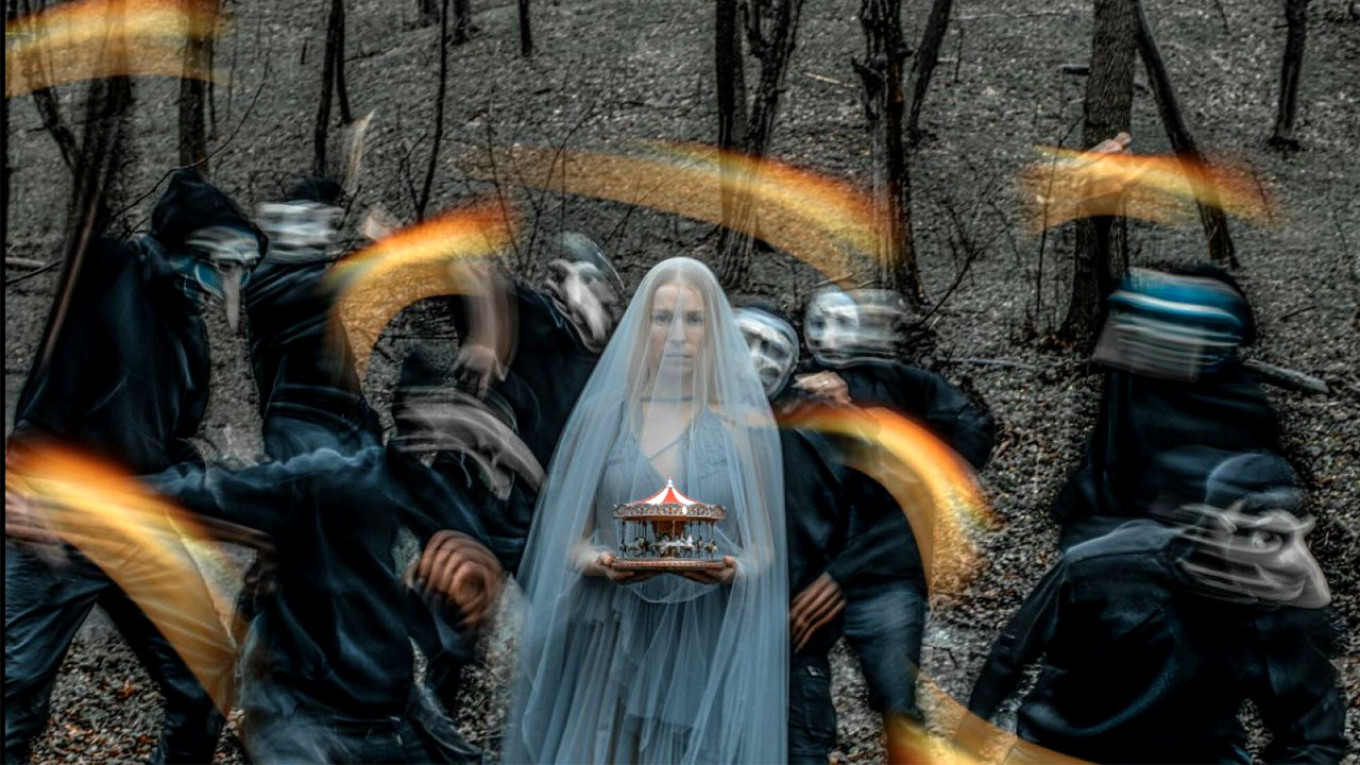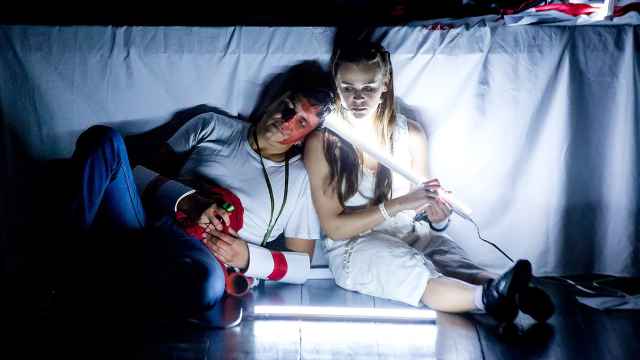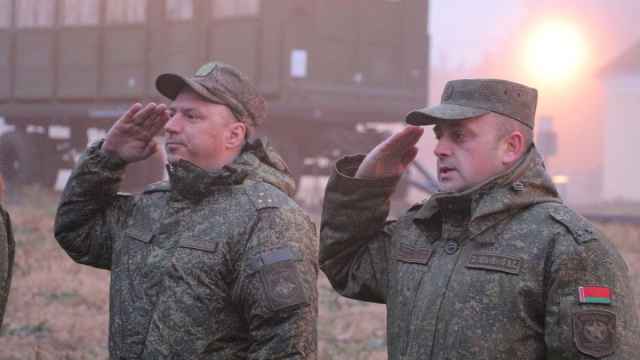Expectations were high for the new staging of Uladzimir Karatkievich’s classic 20th century Belarusian novel, “King Stakh’s Wild Hunt,” brought to London’s Barbican by the Belarus Free Theatre. The directors, Natalia Kaliada and Nicolai Khalezin, fled persecution in Belarus, and the performers hail from Belarus and occupied Ukraine. Tom Stoppard and Cate Blanchett are both fans. The show is spoken and sung in Belarusian – a brave riposte to the systematic attacks against Belarusian language and culture by Lukashenka’s regime. So it was a real shame that the Hunt came to town at more of a trot than a gallop.
Karatkievich’s best-known work follows the life of folklorist Andrej Biełarecki, a real historical figure. Andrej is shown here as the 96-year old narrator and as the young hero of his own tale. The young Andrej (played by Andrei Bondarenko) gets lost in the marshes and is received at the castle of cursed heiress Nadzeija Janoŭsaskaya (Tamara Kalinkina) with whom he falls in love. Andrej stays to protect Nadzeija from the ghosts persecuting her family, while he too is drawn in by the supernatural horror of King Stakh and his Hunt.
So far, so promising. The problem lay in the rather abstract interpretation of a work that was unfamiliar to much of the London audience. There was a wealth of talent on display — physical contortion, as well as pyrotechnics, stilt-walking, and a stirring operatic score — but the elements didn’t entirely come together.
But there were moments of beauty and strangeness. In one scene, unearthly women in stilettos force our hero to use their hair as a skipping rope, blurring a childhood nightmare with an adult fetish. The designers deserve praise for costumes that scream “19th century” without fussiness: torn ballgowns; candelabras, riding boots and gloves. And there was a memorable duel where blindfolded men crawl across a banquet table smoking pipes while figures in elk headdresses tie nooses around the necks of the dinner guests.
There were many such images of hanging, which were meant to echo the abuse of political prisoners in Belarus. Yet without this essential context the spectacle was more unsettling than moving. Similarly, a funeral scene paid tribute to the director’s late father and addressed the problem of repatriating the bodies of loved-ones during wartime. Audience members could learn about this only if they succeeded in navigating the Barbican’s maze-like interior to find the QR code to the play’s digital program.
Performances in Belarusian are rare in London, and this was a sold-out event with recognizable members of the Belarusian expat community in attendance. The applause was respectful, but there were grumblings among Karatkievich’s fans that beloved characters had been left out or misinterpreted, or that speaking Belarusian hadn’t helped at all with following the plot.
For those who didn’t know the language, the botched subtitling drew particular rage. The English script, in tiny white letters on a pale screen, fought valiantly against the lamplight, the dry ice, and the inexplicable snowstorm in the final act, but ultimately lost the battle it. However, it was quite effective as an unintended statement about the censorship of Belarusian.
While “King Stakh’s Wild Hunt” did not fully succeed as a traditional tale or a contemporary political parable, it was a major theatrical event in London and essential viewing for anyone interested in Belarus and contemporary European theater.
For more information about the Belarus Free Theatre and this and other upcoming productions, see the site here.
A Message from The Moscow Times:
Dear readers,
We are facing unprecedented challenges. Russia's Prosecutor General's Office has designated The Moscow Times as an "undesirable" organization, criminalizing our work and putting our staff at risk of prosecution. This follows our earlier unjust labeling as a "foreign agent."
These actions are direct attempts to silence independent journalism in Russia. The authorities claim our work "discredits the decisions of the Russian leadership." We see things differently: we strive to provide accurate, unbiased reporting on Russia.
We, the journalists of The Moscow Times, refuse to be silenced. But to continue our work, we need your help.
Your support, no matter how small, makes a world of difference. If you can, please support us monthly starting from just $2. It's quick to set up, and every contribution makes a significant impact.
By supporting The Moscow Times, you're defending open, independent journalism in the face of repression. Thank you for standing with us.
Remind me later.







